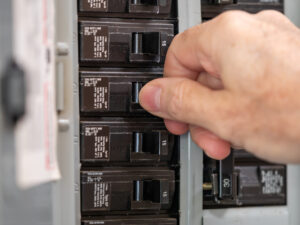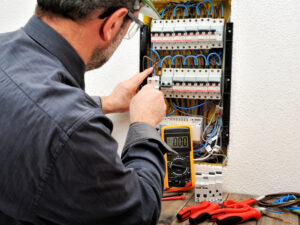Can Your Circuit Breaker Support All of Your Electronics?
You may not think about it all that often, but nearly every aspect of your day-to-day life is powered by electricity. Whether you’re cooking, showering, or even just turning on a light once the sun goes down, it’s all thanks to an electrical current. With so many devices in the modern home, it’s common for circuit breakers to be installed to prevent blowing fuses or causing other devices to short-circuit. However, with the holidays coming up, your dazzling light display may put too much pressure on your circuit breaker. Read on to discover how you can tell if your circuit breaker is able to support all your electronics, and what to do if it’s not.
Breaking Down Circuit Breakers
What are they?
Simply put, a circuit breaker is a device that is designed to protect a circuit from overloading. If you have an older home, your system may solely rely on fuses, while most newer homes are equipped with circuit breakers. A typical modern home has a large circuit breaker that consists of several smaller circuits dedicated to specific purposes. Your home will usually have one central circuit breaker box with the circuit breaker switch inside.
What do they do?
Circuit breakers are programmed to stop the flow of electricity if the system begins to overload. If a circuit breaker detects a problem, a switch will be automatically flipped to—as the name suggests—break the circuit. This prevents your electrical system from shorting out or shutting down altogether. They’re essentially safety devices, as an overloaded circuit can cause a serious fire hazard. That’s why it’s paramount to the security of your home to ensure that your circuit breaker is functioning properly. Before switching a circuit back on, unplug devices currently plugged into that circuit and turn off light switches,
Supporting Your Electronics
Think of all the devices in your home that are powered by electricity: from the basic utilities like lights, heating, and hot water to the smaller items like hairdryers and televisions. Your home requires a lot of electricity. If your home is properly outfitted with a reliable circuit breaker, those demands are no problem. However, if your circuit breaker isn’t strong enough to handle that amount of voltage, you could be dealing with a damaged electrical system and damaged devices due to power surges.
What happens if my circuit breaker overloads?
When your circuit breaker overloads, it is because the device is being asked to handle an amount of voltage that is higher than what it was built to withstand. Just like you cannot put a 100-watt lightbulb into a 50-watt lamp, you cannot force a 120-volt circuit breaker to support 500 volts worth of electricity. If the circuit overloads, you may need to call an electrician before your home can power back up.
How can I fix an overloaded circuit breaker?
If your circuit breaker is overloaded, you may be able to correct the problem by redistributing the electrical load to other circuits or creating new circuits. However, if you’re not sure how to do this or if you don’t have much experience with electrical systems, it’s best to call an expert. Your electrician can properly redistribute the electrical load or run a new circuit to offset the voltage.
What can I do to avoid overloading my circuit breaker?
While it may seem daunting, it’s relatively simple to avoid overloading your circuit breaker. To ensure that your circuit breaker can support all your electronics, make sure you know exactly how much voltage your circuits can take and how much voltage your appliances require.
Devices that necessitate high amounts of electricity like refrigerators, heaters, and dishwashers should never be plugged into the same outlet—if they are, be sure that the circuit can sustain that amount of energy. You can also try not to use too many devices at once, or at least not plug them into the same circuit. For example, a toaster and a coffee maker should not use the same outlet. A good rule of thumb to follow is if it’s a heat-producing device, only plug one into a given outlet at a time.
What if my circuit breaker can’t sustain my appliances?
If you discover that your circuit breaker cannot handle all the devices in your home or business, it’s essential to suspend the use of as many appliances as you can and call an electrician right away. They will be able to advise you on the best course of action, whether that be installing a new circuit breaker or running new circuits throughout your home or business.
Whether you’re dealing with a blown fuse, a defective generator, or you require an entirely new remodel plan, you can rely on JP Electrical and our team of expert contractors to restore the function of your home or commercial property. We are based in North Salt Lake City but proudly serve the entire Wasatch Front here in Utah. For more information on our electrical services, please call (801) 683-0374 or send us a message at info@jpelectric.com.
Categories: Electrical Maintenance




Leave a Reply